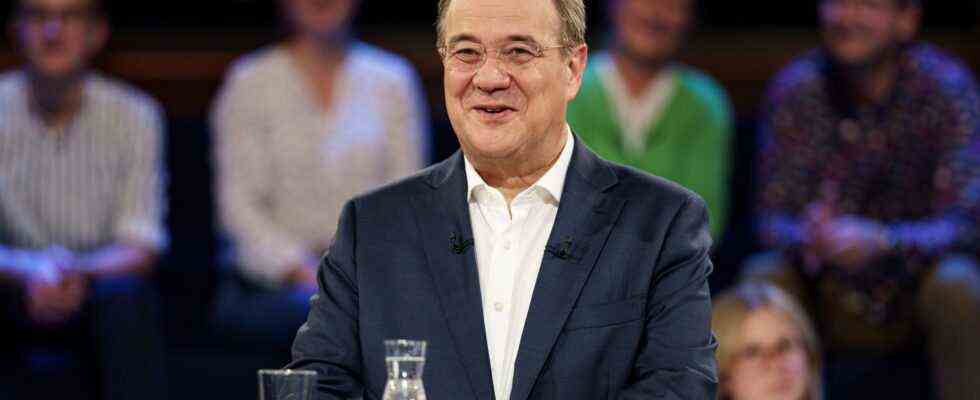analysis
Status: 16.09.2021 12:13 a.m.
Union Chancellor candidate Laschet is in the ARD election arena on the home stretch of the election campaign more connecting than offensive. He tries to score with affability without getting too specific on political issues.
Armin Laschet looks quite relaxed in this election arena for the fact that the Union slipped to a record low half a month ago in polls in the latest German trend. In contrast to Sunday’s Trielli, he walks around without a tie, wears his shirt slightly unbuttoned and pretends to be an understanding and a carer. This time he doesn’t have to attack any political opponents, his competitors for the Chancellery are far away. In the election arena, the questions of the audience are in the foreground. This role of the listening country father is noticeably more important to him than that of the attacker.
There is the young woman who wants to hear an answer from him for all the young couples who do not dare to have children because of global warming. “It is of course very personal and heartfelt when a young person says: I don’t know whether I can still have children there.” He uses the moment – as he often does in these 75 minutes of broadcasting – to contribute something suitable from his biography: As a young person, he was afraid of nuclear war. Then he asks the Stuttgart woman again and at that moment seems more like a pastor: Is she worried about having children for herself? She nods. You have to take that seriously, says Laschet: “I would like to give you the confidence and say: We can do it.”
He previously stated that there was no disagreement between the parties about climate protection, the key question was just how. Later, when asked by a climate activist from Fridays for Future, he emphasized again that climate policy can be created if “we define fields of action across party lines”. For example, faster planning and approval procedures for the construction of railway lines and power lines: “That takes far too long.”
Apparently shies away from clear definitions
This is what he seems to have planned for this performance: to be the integrative, unifying politician without bothering his audience with too much concrete information. He also answered evasively, at the same time dissolute, when a student asked whether he was in favor of a nationwide anti-discrimination law. After all, as a former integration minister, the topic is very important to him. He evidently shies away from making clear statements that make him appear too progressive in the eyes of some core voters. It is said in the Union that he must by no means lose it. And so he stays again with the Personnel Maaßen, about which a Turkish-born lawyer asks him, quite cloudy.
Laschet stays with short, catchy sentences – does not delve deeper into complicated climate protection issues such as CO2 pricing or emissions trading certificates – and thus remains even more vague than the Union election program already is. “We have to do more everywhere,” he says to the Stuttgart woman and the climate activist. And the Prime Minister of North Rhine-Westphalia replied to a bus driver from Augsburg who wanted to hear what he was planning to do against rising rents: “I think we just need more apartments”. He is planning 1.5 million more in the “next few years”, but it will not be more precise. Not even when moderator Andreas Cichowicz asks how much of it should be social housing. The proportion must increase, so Laschet – a master of simple sentences.
It is noticeable that in almost every answer he includes a sentence with the self-projection, “I as Federal Chancellor”, which he also seems to have planned. Whether it is about the flood victims in the Ahr valley, the disabled or people with a migration background: “I would say to them: I am also your Federal Chancellor” – and not only for those with German citizenship.
Central message is missing
What is missing on this evening – as with previous Laschet appearances – is a central message, which is why he, of all people, wants to ensure a departure in the next four years – and how. The word “decade of modernization”, with which he had applied for the CDU chairmanship together with Health Minister Jens Spahn, does not come out of his lips in this group. Rather, he often emphasizes that with all the pending changes towards a climate-neutral industrialized country, “which climate change is forcing us to do”, empathy and social acceptability must apply to those who are affected – such as the appealing, worried young father of a family from the lignite opencast mine in Lausitz.
However, Laschet has perhaps the most difficult task compared to Olaf Scholz and Annalena Baerbock: On the one hand, the 60-year-old cannot spoil the political legacy of the Merkel era and yet has to signal that many things are about to change now. On this evening, he seems to have decided to convey a continuity that does not entail too many unreasonable demands for the future.

